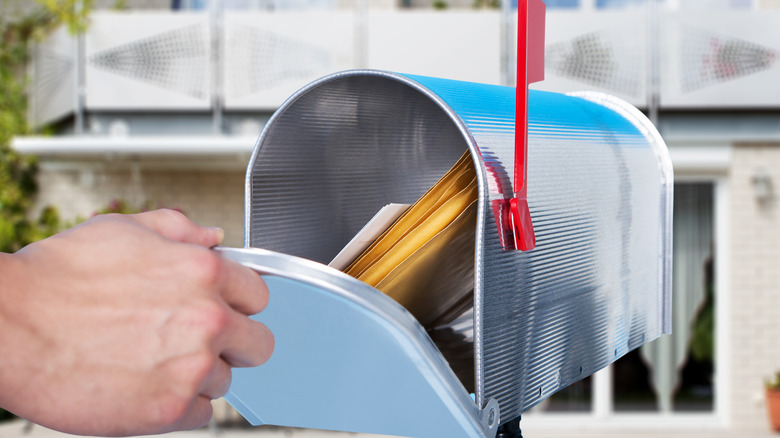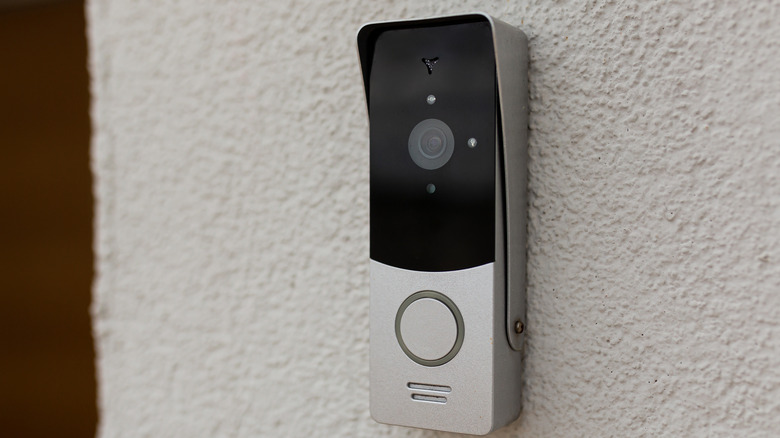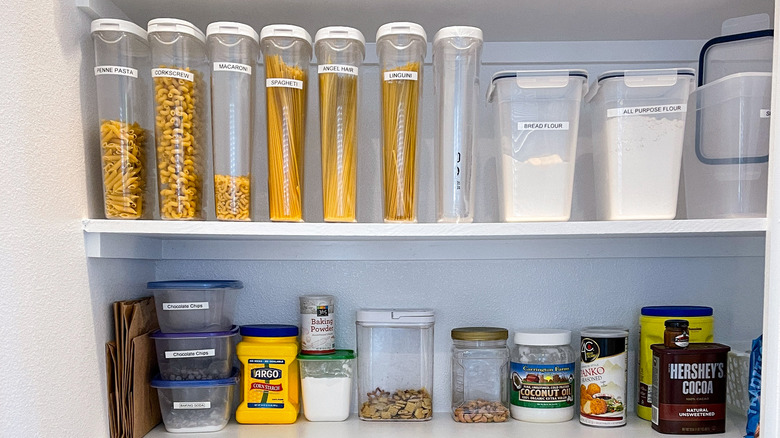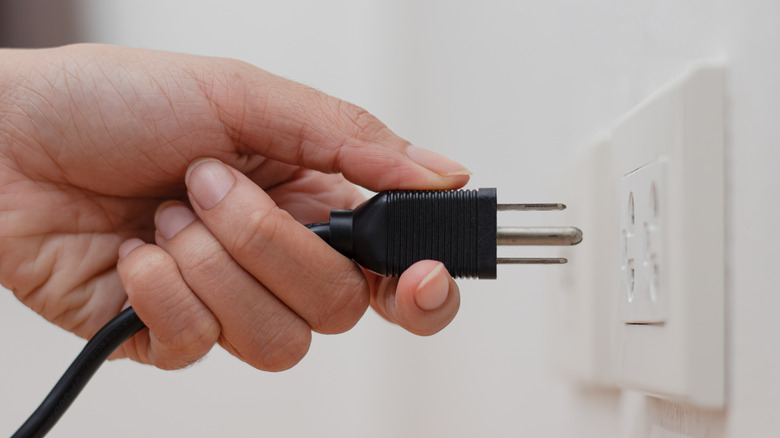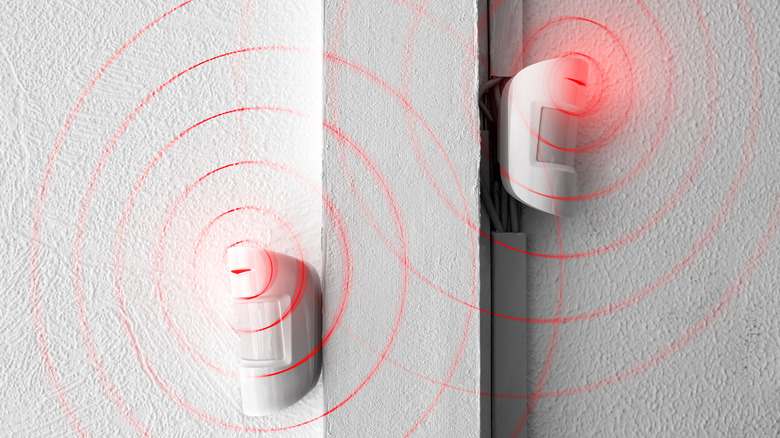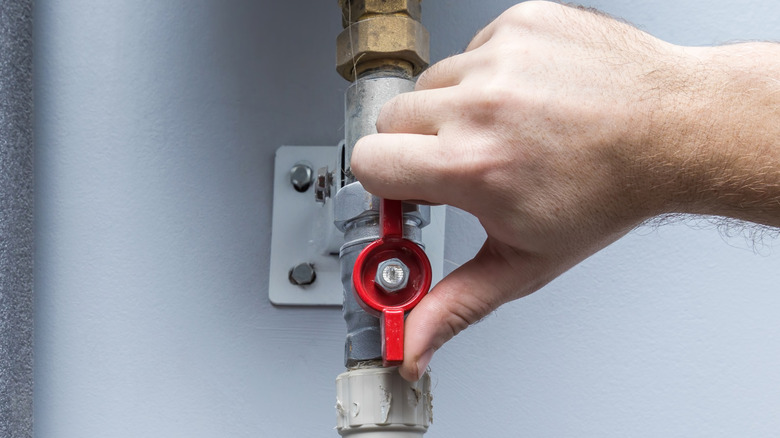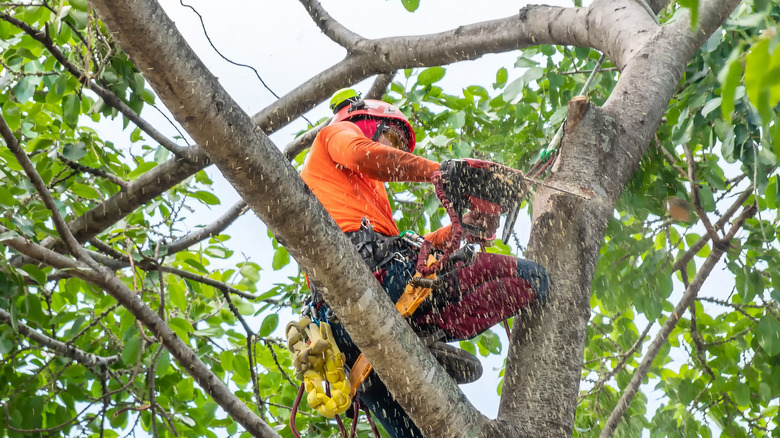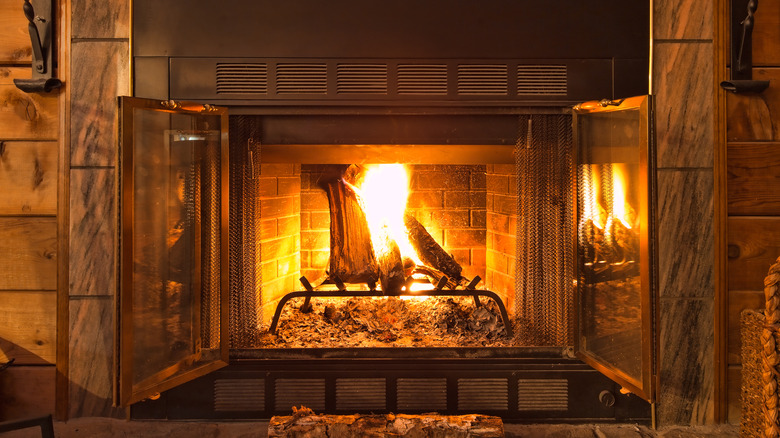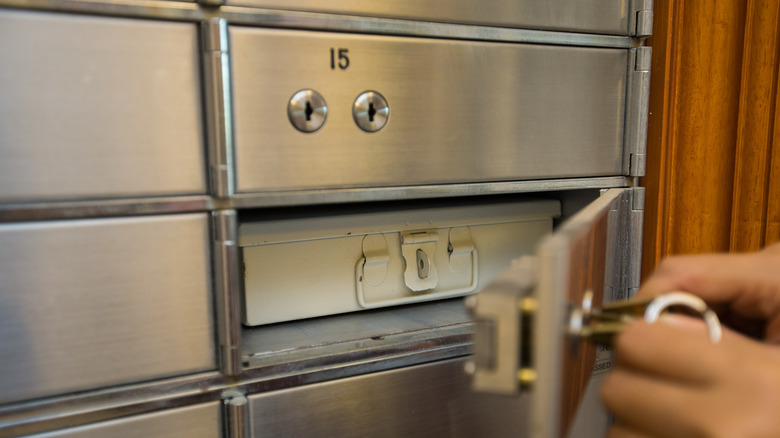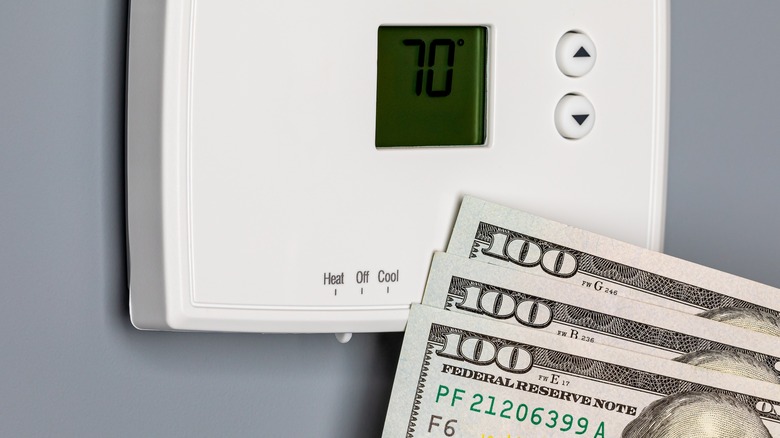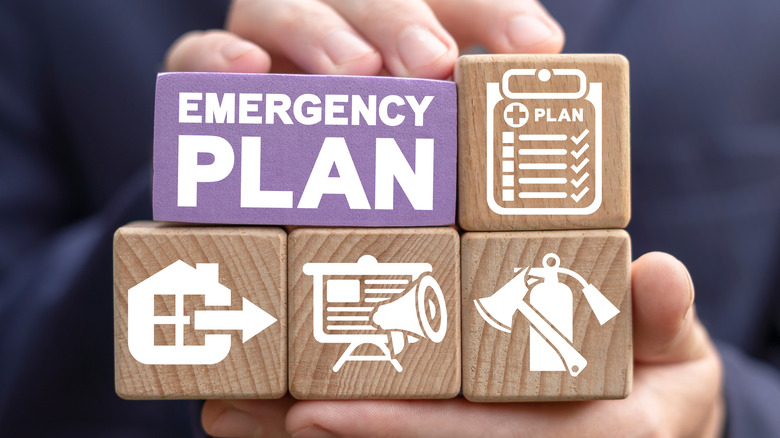Top Safety Tips For Extended Stays Away From Home
Whether you live between two properties or are taking an extended vacation, you need to know how to keep your home safe while you are away. According to New Home Source, many older Americans are purchasing a second home to enjoy in their retirement. Some enjoy being snowbirds, a nickname for retirees that chase the sunshine and spend the colder parts of the year in the southern parts of the country, like Arizona or Florida. Others purchase a second home to be closer to family members more often.
With the rise of working remotely, even younger homeowners are spending more and more time away from their primary residence, either in a secondary property or being fully nomadic. That said, leaving your home unattended for longer than the typical vacation comes with a set of unique safety and security risks. It's not always as simple as having a neighbor keep an eye on your home over the long weekend — things can really go wrong. If you are heading out for an extended stay away from home, here is what you need to know.
1. Stop or redirect your mail
Depending on how long you will be gone, you can stop your mail or have it sent to you. According to the USPS, it is relatively easy to accomplish both of these tasks. To redirect your mail, visit the USPS website and fill out the short form. There is a small fee (about $1) to pay, but the service is basically free. You can redirect your mail to a trusted friend or family member or your other residence. The service is available for a minimum of 15 days and up to a maximum of 365.
If you are traveling and not in a place to collect your mail at a secondary location, it might be easier to hold your mail completely. This way, people won't see piles and piles of mail in your mailbox or sitting on your front table and know you are gone. Holding mail is similar to redirecting it. Fill out the online form a few days in advance. Holding is only available for up to 30 days, at which point it needs to be collected. If you are not home yet, this could be a job for a family member or house sitter.
2. Install a porch video monitor
If you are away from your residence for long periods, a video monitoring system can provide you with great peace of mind. However, a full-blown CCTV security system might seem a bit overkill. A great happy medium is installing a video doorbell or other simple home video system to keep an eye on things. According to SlashGear, one of the main perks of a video monitor doorbell is confirming when a package has arrived. When you are away, courier services might still deliver things to your home. If you need time to organize a friend or house sitter to collect the package, a video doorbell can ensure that no one takes it in the meantime.
In addition, you can keep an eye on other comings and goings in your neighborhood. If anyone suspicious is poking around your front porch, you'll have them on video. If you often split your time between two or more homes, it's a great idea to place a second doorbell on your back porch so you can have that added layer of security.
3. Consider hiring a house sitter
If you are going to be away from your home for weeks at a time, it's not a good idea to leave the house completely vacant the whole time. Things can go wrong, and if no one is there to at least check in on things occasionally, then even the smallest of problems can quickly become catastrophic. To avoid this, consider hiring a live-in house sitter or occasional property manager to make your home more secure. According to Erie Insurance, if you find a house sitter on a popular and trusted website, creating a contract might make you feel more comfortable about them living in your home. While most professional websites carry insurance and behavior expectations in their terms of service, a contract with details about expectations for your home will provide further coverage for your situation.
In some instances, a house sitter can look after your property in exchange for free accommodation. If this is the case, discuss how to handle things like utilities and food before you leave to avoid any confusion. Other times, you will need to pay your property manager for their time checking in on your home. This fee could be a pre-approved stipend for the length of time or a per-visit payment.
4. Donate or eat all perishable items
Before leaving a property for the season, it's essential to look around your pantry and your fridge so that you don't attract pests or come home to a biohazard. Take a look through your pantry and ensure that all packaged, non-perishable items you are leaving behind are not in chewable packaging.
According to The Inspired Home, once you've cleaned out your pantry, it's time to turn your attention to the refrigerator. First, completely take everything out. From here, you'll want to sort items into what's okay to keep and what you need to throw away. Realistically, if you are leaving home for more than a month or so, you should completely clear everything out because you might want to unplug your refrigerator. After removing the food, do a deep clean of the inside. You'll want to remove each shelf and scrub off all the spills and stains that might attract insects like ants.
5. Unplug most appliances to avoid risk
Per USA Today, unplugging appliances to save money isn't a good idea. The energy you might save by disconnecting your lamps each morning before you go to work is negligible. However, if you aren't going to be in your house for weeks or months at a time, it may be best to unplug everything for safety. You can do this to avoid any chance of an electrical fire. Unfortunately, electrical fires are a substantial risk, especially when you are away from home for long periods. The risk increases because you are not around to physically inspect any faulty wiring or swap out aging components. If you don't plug something in, it can't short out or spark and cause an issue.
You will save energy costs in the long run because you will be gone for an extended time. It doesn't make sense to power the refrigerator, oven, and Internet modem in an unoccupied house (via Axiom Power).
6. Install motion-triggered outdoor lights
Leaving lights on continually while you are away (especially for long periods) is a clear indicator to thieves that no one is home. Instead, consider installing motion-triggered lights on the property before you go. According to Pest Pointers, these lights work well because they deter intruders and pests. Animals don't want to be noticed by predators, so if you suddenly blast them with a ray of light, their instincts will kick in, and they will typically run off. This news is good, as you don't want to come home for the summer to find a family of raccoons has made a residence in your kitchen.
The good thing is that motion sensor lights are easy to install. Even the most DIY-adverse homeowners can put them in, as sometimes it's even as simple as just switching out the bulb in an existing light fixture (via Beacon Home Services). In addition, you might consider connecting your interior lights to a smart home app, so you can control them remotely.
7. Create a home inventory
Before you leave your house for the season, be sure to create a home inventory. It's a good idea to make a list of what's in the home, should anything happen to it. According to the Insurance Information Institute, a list makes the insurance claims process much easier. There are a few different ways to avoid feeling overwhelmed when creating your first inventory.
You can organize your home by room or by category. For example, you might list everything in your home office, like your computer, baseball card collection, and desk. Or, you might decide to go through your house and catalog your electronic items, jewelry, and paintings. Wherever possible, photograph items you add to the inventory and note their approximate value. You can make a paper list or a digital one. If you prefer, many insurance companies have apps specifically for this purpose. You can download it directly to your Apple or Android device.
8. Inform your neighbors of your absence
If you are heading south for the winter or out of state for the birth of a new family member, let your neighbors know your plans. Typically, neighbors are your first line of defense if something should go wrong with your property. Even if you hired a house sitter or property manager, they might not be home or scheduled to work that day. If your house is on fire, getting broken into, or even if there are just a few packages sitting on your front porch for too long, your neighbors can help.
According to Nest Realty, you should let your neighbors know a few key pieces of information. First, tell them when you are leaving and when you will return home. Give them your contact information and a way to reach out to anyone who will be caring for your property. You might also give them a brief description of your house sitter or property manager and their vehicle, just so your neighbors know what to expect.
9. Turn off the water supply and insulate vulnerable pipes
If you are leaving your home to spend the winter somewhere a bit warmer, then it is essential to prepare your water supply before you go. According to Pete the Plumber, this means turning the supply off completely, as too much water in the wrong place can ruin your home. A frozen pipe might burst, your water heater might leak ... you never know. If you are going away for the season, it's better not to risk it.
However, you can't just turn off the water and leave it at that. You should take a few more steps to ensure you don't come home to a waterlogged mess. To confirm that a pipe doesn't swell and burst in your absence, or the water left in the pipes doesn't leak out and ruin your carpet, be sure to leave enough time between turning the water off and leaving your house to drain your pipes. Let your faucets run, flush your toilets a few times — really give everything a chance to clear out. In addition, insulate any vulnerable pipes (ones that lead outside and are particularly old) with heat tape or cables (via State Farm).
10. Trim trees to avoid potential storm damage
You don't want to return to your primary residence early to deal with a branch in your living room or postpone your vacation because your beach house suffered damage in the latest storm. Instead, be sure to trim your trees and perform any essential yard maintenance well before you leave for the season.
According to The Wood Group of Fairway, you can clear tree branches by yourself with the proper safety equipment. Ensure you have a ladder, sturdy gloves, safety glasses, a hard hat, and shears. Remember to never sit on the branch you are sawing and never climb up in a tree if no one else is home. If you don't feel comfortable trimming your own trees or just don't have the time in your schedule to clean things up before you leave, it's possible to hire a professional arborist team to take care of it for you instead.
11. Close the fireplace and major vents
It's definitely unsafe to share a house with a raccoon, so ensure you close up your fireplace and vents before leaving home. According to EnviroCon Termite & Pest, pests like bugs can make their way inside through these places and small cracks. You can use caulk to seal the spaces around exterior pipes and cables, but you might need more supplies to patch up larger gaps like bricks, wood, and synthetic siding.
It's also a good idea to have an exterminator come to your property before you leave. They can spray your home and ground with chemicals to keep pests out as a preventative measure so you don't come home to ants in places they shouldn't be. You can purchase the chemicals at local home improvement stores and do things yourself. However, if you don't have time or interest in debugging your own house, you can always hire a professional (via Pestrol).
12. Store most valuables offsite or in a safe
You don't want to leave valuable items unattended for weeks or months, especially if you don't have a live-in house sitter. Leaving them behind makes them vulnerable to theft or destruction if anything happens to your home. Instead, consider taking valuables with you and leaving others with the bank in a safe deposit box. For example, you might feel comfortable taking certain pieces of jewelry and electronics to your summer home or even on your extended vacation. However, you might not want to take your entire jewelry collection, priceless family heirlooms, or collectibles like baseball cards or stamps.
According to Investopedia, safe deposit boxes can withstand fires, floods, and high winds — things that a typical home usually cannot survive. Many homeowners who spend time away might choose to store some of their valuables here. However, if you have a will or power of attorney stored in the box, ensure it's not the only copy. If anything happens to you, it will be difficult for your loved ones to access these items, so store them with a lawyer instead.
13. Adjust the thermostat
There is no point paying heaps of money to keep an empty house at a comfortable temperature. However, it's not a good idea to completely turn your temperature control off because you don't want anything to melt or freeze in the interim. According to Service Specialties, Inc., you don't want to keep your thermostat so far off from the typical temperature that you use overwhelming energy to make things comfortable when you get back. The sweet spot is to change your thermostat about five degrees off what you usually have on. If you typically keep things at 75 degrees while you are home during the day, set it up to 80 degrees instead.
Your thermostat will kick on when needed and won't constantly run in your absence. It keeps things safer for you overall because it ensures the humidity levels in your home never become overwhelming and damage your belongings, nor will things become so cold that things like electronics begin to freeze and crack.
14. Make a plan for emergencies
If the worst happens, what will you do? Before leaving your home for the season, be sure to have a solid plan for emergencies, minor and major. The first thing to consider is who you want to be in charge in the event of an emergency. This person could be your house sitter or paid property manager, but you also might prefer they contact a friend or family member instead. Alternatively, you might want to be the sole emergency contact. Decide what instances warrant your immediate return and what complaints you can handle remotely.
According to the American Red Cross, you should write, discuss, and practice your emergency plan with family members. While these plans typically refer to keeping you and your family safe in the midst of a natural disaster, you can apply the same principles to preserve your property and those looking after it, too.

